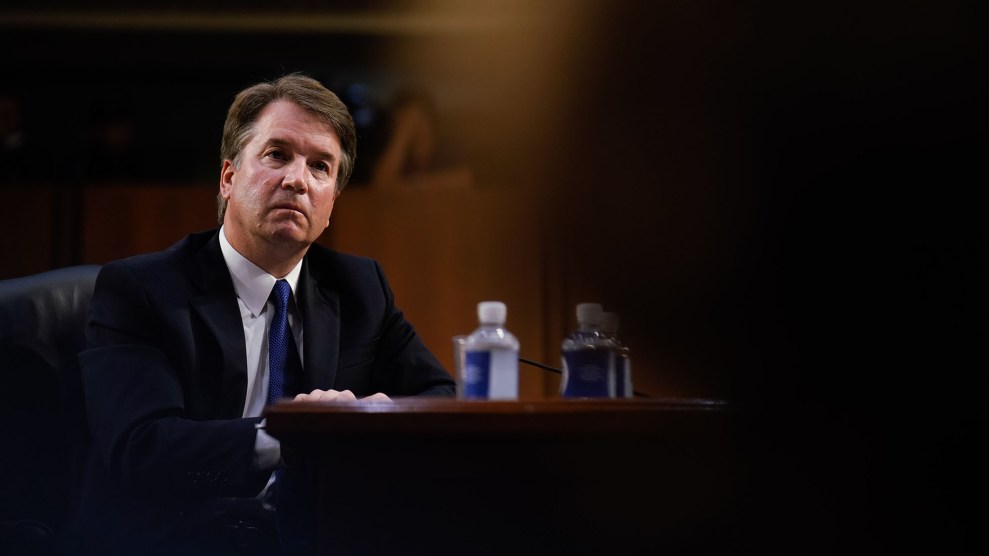
Supreme Court nominee Brett Kavanaugh during the first day of his confirmation hearing.Ken Cedeno/ZUMA
In February, special counsel Robert Mueller handed down a stunning indictment against 13 Russians and three Russian companies for interfering in the 2016 election. The 37-page document laid out an expansive and well-financed influence operation to sow discord in the election and help elect Donald Trump. It included charges of conspiracy to defraud the United States, conspiracy to commit bank and wire fraud, and aggravated identity theft.
To the surprise of many, there were no election-related charges. The reason is almost certainly a 2011 ruling by Brett Kavanaugh.
From the start, Kavanaugh’s nomination to the Supreme Court has generated concern that the DC Circuit Court of Appeals judge, who has expansive views of presidential power, immunity, and secrecy, will protect Trump from the Russia probe if confirmed to the nation’s highest court. But little attention has been paid to a decision he wrote that already paved the way for foreign election interference and is making Mueller’s job harder—a decision that some election law experts view as sloppy and politically motivated.
In 2011, two foreign nationals brought a case challenging a 2002 law that bans foreign contributions to US political campaigns or electioneering efforts. It was the year after the Supreme Court’s Citizens United decision had opened campaigns to a deluge of spending from private companies and unions, and this case seemed likely to determine whether the next step in campaign finance deregulation was to open campaigns to foreign money as well.
In Bluman v. Federal Election Commission, Kavanaugh wrote for a three-judge panel that people who are not citizens or legal permanent residents cannot contribute directly to campaigns or to “express advocacy” work, which explicitly asks voters to support or oppose a specific candidate. But he gutted the portion of the law that banned foreign spending that is not “express advocacy.” Following his ruling, some of the ads paid for by the Russians in 2016 and named in the February indictment—featuring such messages as “Hillary Clinton Doesn’t Deserve the Black Vote” and “Hillary is Satan, and her crimes and lies had proved just how evil she is”—may well be legal foreign influence activity.
Justin Levitt, an election law expert and former Justice Department official during the Obama administration, says that when it comes to most noncitizens, “Congress said you may not give money or spend money in an attempt to influence an election. Period. Kavanaugh implemented a huge carveout.”
The ramifications of this decision are evident not only in the lack of campaign-related charges in the February indictment; one of the indicted companies repeatedly cited Kavanaugh’s ruling in a court filing seeking to get the existing charges against it dismissed. During the 2016 presidential campaign, Concord Management and Consulting, which is controlled by a Russian oligarch close to President Vladimir Putin, allegedly spent $1.25 million per month to set up rallies, spread disinformation, and “interfere in U.S. political and electoral processes without detection of their Russian affiliation,” according to the indictment. For this, Concord was charged with conspiracy to defraud the United States.
Now, the company is now using Kavanaugh’s decision in Bluman to try to have the charge dismissed on the grounds that its activity was legal. “Foreign nationals are not barred from issue advocacy through political speech such as what is described in the indictment—they are only precluded from willfully making expenditures that expressly advocate the election or defeat of a particular candidate,” the company’s lawyers wrote. Election law expert Rick Hasen of the University of California, Irvine School of Law told the Washington Post in July that Kavanaugh’s decision creates “potentially a huge loophole for foreign and undisclosed issue ads on federal elections.”
Through his opinions and his work as an aide in the George W. Bush administration, Kavanaugh has proven himself a deep skeptic of campaign finance regulation. The Supreme Court may take up two campaign finance cases this fall, giving Kavanaugh, if confirmed, an immediate chance to begin to further unwind restrictions on campaign donations and potentially increase foreign influence on US elections.
The Bluman case also led some election law experts to question Kavanaugh’s process as a judge. The case was about the right of foreigners to donate to candidates, yet Kavanaugh chose to invalidate part of a federal statute, the Bipartisan Campaign Reform Act of 2002, that was not even at issue. “This statute, as we interpret it, does not bar foreign nationals from issue advocacy—that is, speech that does not expressly advocate the election or defeat of a specific candidate,” Kavanaugh wrote, without explaining the rationale for his assumption.
Kavanaugh “wiped out a big chunk of a congressional statute without ever explaining why,” says Levitt. “It looks like redrafting a statute to do something he likes better, rather than issue a constitutional holding. And that’s not something we want our judges to do.”
Update: Sen. Amy Klobuchar (D-Minn.) asked Kavanaugh about this case during his confirmation hearing Wednesday afternoon, noting that his opinion “left open the possibility of unlimited spending by foreign nationals” on issue advocacy in US elections and that a Russian company was citing it in its defense against Mueller’s indictment. In response, Kavanaugh appeared confused by the question, appearing not to remember this part of his opinion or to be aware of its ramifications.
Listen to reporter Stephanie Mencimer discuss the chaos surrounding Kavanaugh’s confirmation hearing in this week’s episode of the Mother Jones Podcast:












